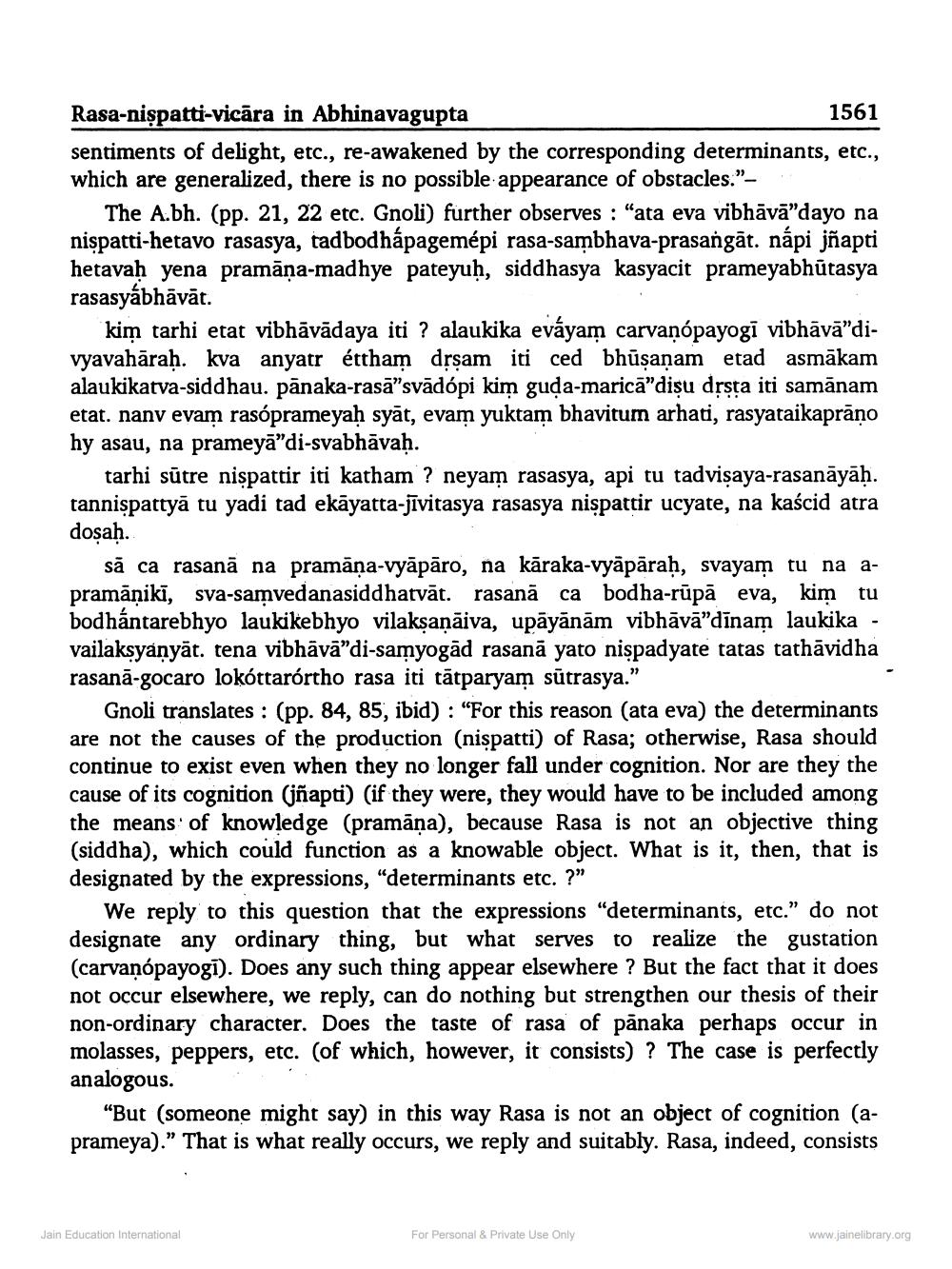________________
Rasa-nișpatti-vicāra in Abhinavagupta
1561 sentiments of delight, etc., re-awakened by the corresponding determinants, etc., which are generalized, there is no possible appearance of obstacles.”
The A.bh. (pp. 21, 22 etc. Gnoli) further observes : "ata eva vibhāvā"dayo na nispatti-hetavo rasasya, tadbodhápagemépi rasa-sambhava-prasangāt. nápi jñapti hetavah yena pramāņa-madhye pateyuḥ, siddhasya kasyacit prameyabhūtasya rasasyábhāvāt.
kim tarhi etat vibhāvādaya iti ? alaukika eváyam carvaņópayogi vibhāvā"divyavahāraḥ. kva anyatr éttham drsam iticed bhūṣaṇam etad asmākam alaukikatva-siddhau. pānaka-rasā"svādópi kim guda-maricā"dişu dřsta iti samānam etat. nanv evam rasóprameyah syāt, evam yuktam bhavitum arhati, rasyataikaprāno hy asau, na prameyā"di-svabhāvah.
tarhi sūtre nispattir iti katham ? neyam rasasya, api tu tadvisaya-rasanāyāh. tannispattyā tu yadi tad ekāyatta-jīvitasya rasasya nispartir ucyate, na kaścid atra dosah.
să ca rasana na pramāna-vyāpāro, na kāraka-vyāpārah, svayam tu na apramāņiki, sva-samvedanasiddharvāt. rasanāca bodha-rūpā eva, kim tu bodhántarebhyo laukikebhyo vilaksaņāiva, upāyānām vibhāvā”dīnam laukika - vailaksyanyāt. tena vibhāvā”di-samyogād rasanā yato nispadyate tatas tathāvidha rasanā-gocaro lokóttarórtho rasa iti tātparyam sūtrasya."
Gnoli translates : (pp. 84, 85, ibid) : "For this reason (ata eva) the determinants are not the causes of the production (nispatti) of Rasa; otherwise, Rasa should continue to exist even when they no longer fall under cognition. Nor are they the cause of its cognition (ñapti) (if they were, they would have to be included among the means of knowledge (pramāņa), because Rasa is not an objective thing (siddha), which could function as a knowable object. What is it, then, that is designated by the expressions, "determinants etc. ?"
We reply to this question that the expressions "determinants, etc." do not designate any ordinary thing, but what serves to realize the gustation (carvaņópayogi). Does any such thing appear elsewhere ? But the fact that it does not occur elsewhere, we reply, can do nothing but strengthen our thesis of their non-ordinary character. Does the taste of rasa of pănaka perhaps occur in molasses, peppers, etc. (of which, however, it consists) ? The case is perfectly analogous.
"But someone might say) in this way Rasa is not an object of cognition (aprameya).” That is what really occurs, we reply and suitably. Rasa, indeed, consists
Jain Education International
For Personal & Private Use Only
www.jainelibrary.org




